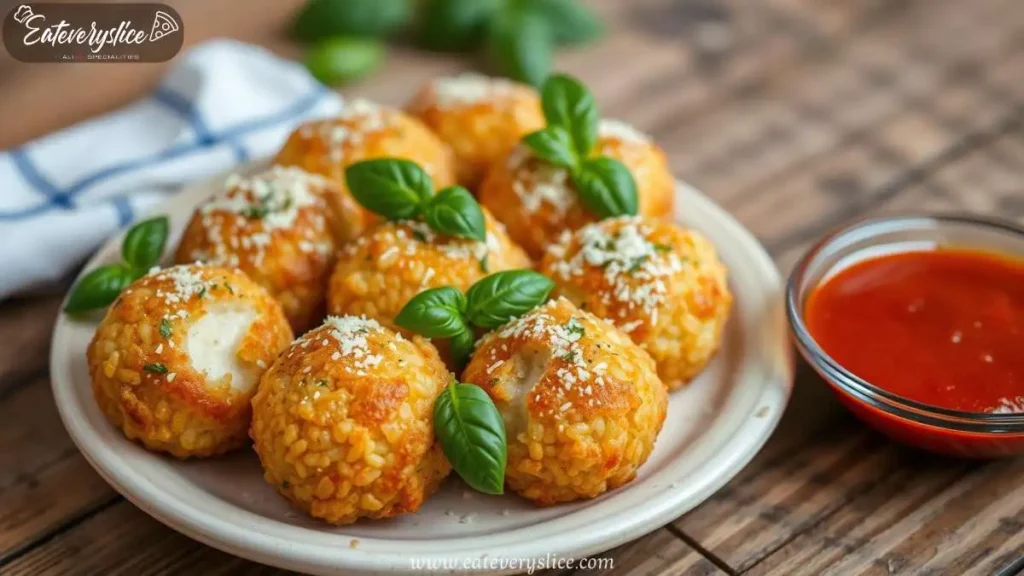Last updated on March 30th, 2025 at 07:27 am
Table of Contents
Italian seasoning is a favorite in many kitchens, adding flavor to various dishes. But have you ever looked at what’s really in it? This guide will dive into its origins, main ingredients, and how to make your own italian seasoning recipe.
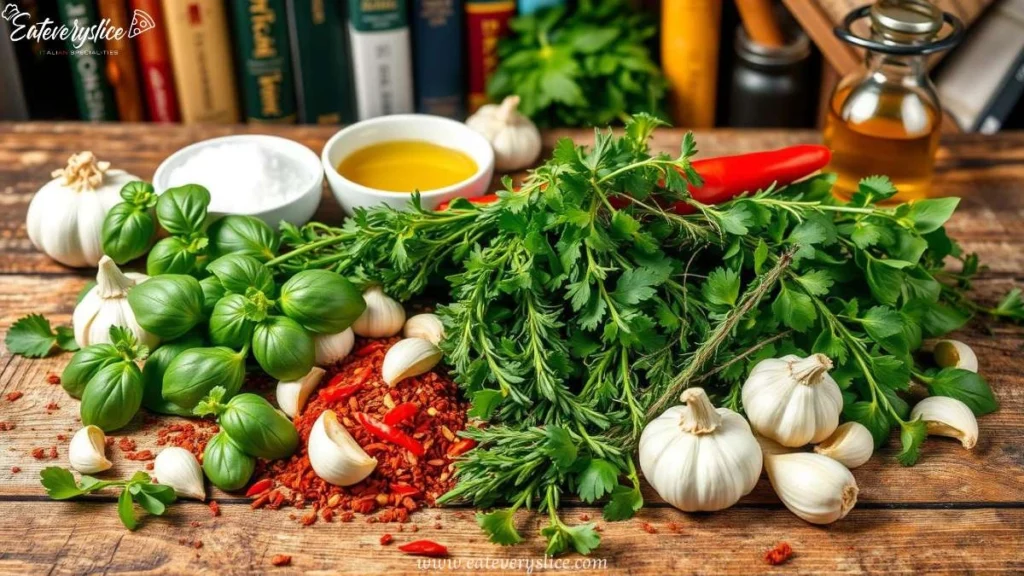
Key Takeaways
- Italian seasoning is a blend of aromatic herbs commonly used in Mediterranean cuisine
- The core ingredients typically include basil, oregano, thyme, and rosemary
- Marjoram and sage are optional but traditional components of the blend
- Tailor your Italian seasoning to your exact preferences.
- Proper storage and preservation techniques are crucial for maintaining the seasoning’s freshness and potency
Understanding Italian Seasoning: A Kitchen Essential
A beloved mix of aromatic herbs, Italian seasoning is a kitchen staple. It comes from the sunny Mediterranean, where Italy’s flavors have won hearts for ages. Knowing where it comes from helps us appreciate Italian cooking’s rich history.
The Mediterranean Origins of Italian Herbs
The main herbs in Italian seasoning – basil, oregano, rosemary, and thyme – come from the Mediterranean. They grew well in the area’s warm, dry weather. Italian chefs use these herbs in their dishes, adding a unique taste that’s now known as Italian.
Why Italian Seasoning Became Popular Worldwide
As Italian food became famous, so did its seasoning. It’s loved for its mix of flavors, making it a favorite in kitchens everywhere. Now, Italian seasoning is a staple in homes and restaurants around the world, showing its lasting impact.
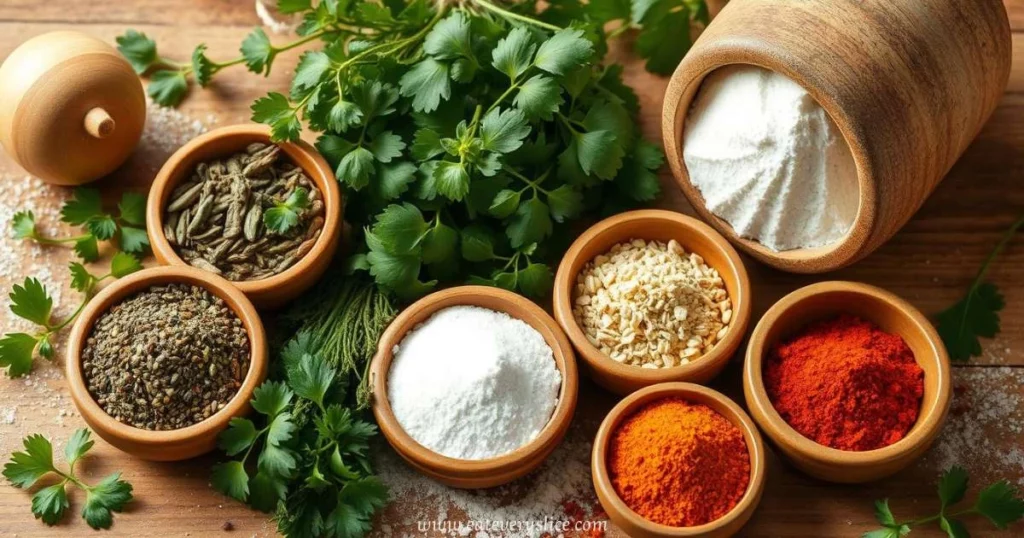
“The herbs of the Mediterranean have become the cornerstone of global cuisine, with Italian seasoning leading the charge in bringing the flavors of Italy to the world.”
What’s in Italian Seasoning: Core Ingredients Explained
Italian seasoning is a mix of aromatic herbs loved by many. It’s a key part of many kitchens around the world. Let’s explore the main ingredients that make this spice mix so special.
The main herbs in what’s in italian seasoning are:
- Basil – Known for its sweet, peppery notes, basil is a key player in the blend, providing a distinct Mediterranean flavor.
- Oregano – With its robust, slightly bitter taste, oregano adds depth and complexity to the seasoning.
- Thyme – This earthy, minty herb lends a subtle, supporting role, complementing the other flavors.
- Rosemary – The fragrant, pine-like essence of rosemary brings a touch of woodsy elegance to the italian seasoning recipe.
These four herbs are the heart of traditional Italian seasoning. They create a blend that makes many dishes taste better. From pasta sauces to roasted veggies, it’s a game-changer.
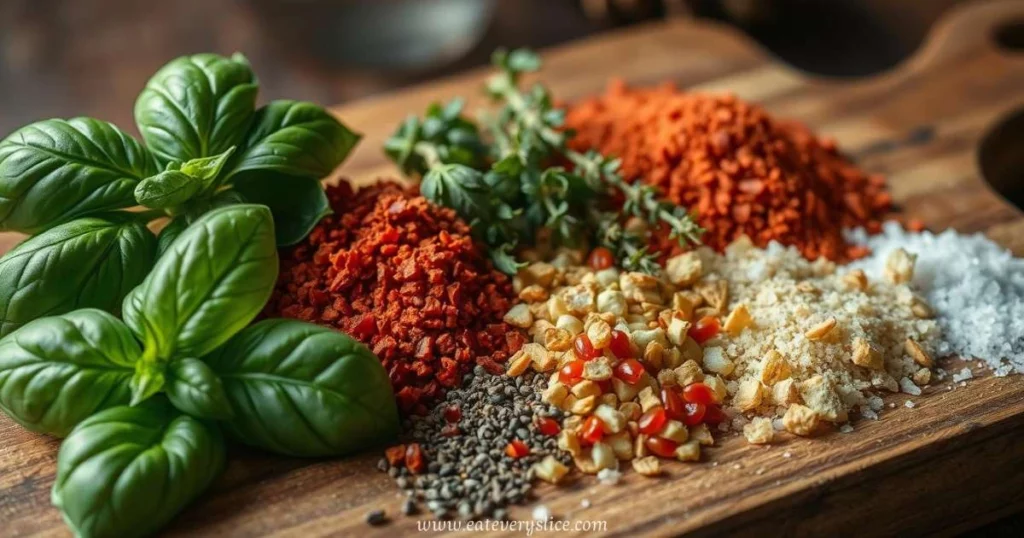
“The perfect Italian seasoning is a symphony of flavors, where each herb plays a crucial role in creating the authentic taste of the Mediterranean.”
The Essential Herbs: Basil and Oregano
Basil and oregano are key to homemade Italian seasoning. They add unique flavors to Italian dishes. These herbs are essential for the seasoning’s signature taste.
Fresh vs. Dried Basil in Blends
Basil contributes a vibrant, sweet, and slightly spicy taste. Fresh basil has a vibrant, herbal flavor. Dried basil, on the other hand, is more concentrated and earthy.
When making your seasoning, mix both fresh and dried basil. This balance creates the perfect flavor.
Oregano’s Distinct Flavor Profile
Oregano is a hidden gem in Italian seasoning. It adds a robust, slightly pungent, and minty flavor. This herb is key to the Mediterranean taste found in many Italian dishes.
Oregano blends with other herbs to create the savory, aromatic essence of homemade Italian seasoning.
Proper Storage Methods
- To preserve basil and oregano, store them in airtight containers away from direct sunlight and heat.
- Dried herbs last 6-12 months. Fresh herbs should be used within a week for the best taste.
- Grow your own basil and oregano for a constant supply of fresh herbs.
Knowing how to store basil and oregano keeps your seasoning blend fresh. This ensures your dishes taste amazing.
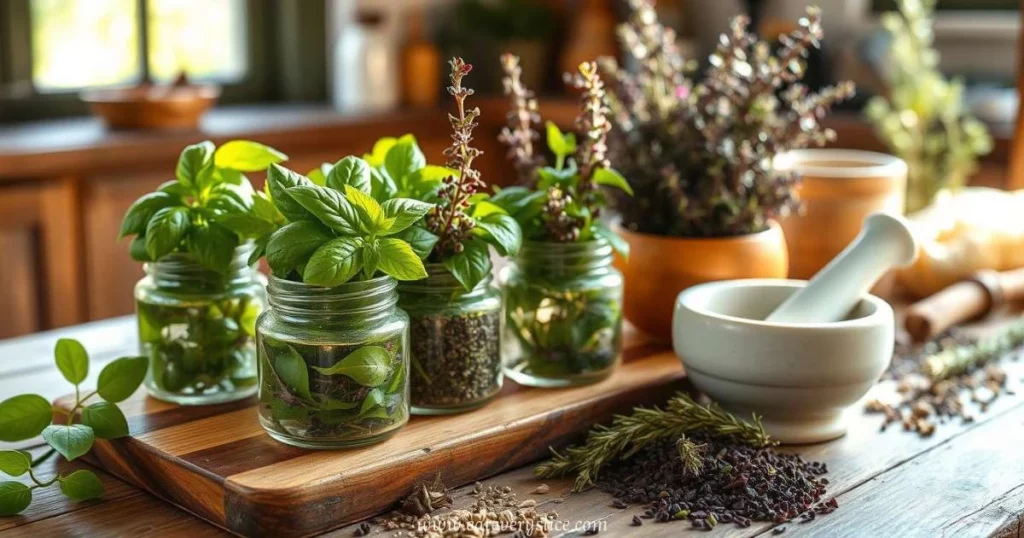
Thyme and Rosemary: The Aromatic Foundation
When we talk about what’s in italian seasoning, thyme and rosemary are key. These herbs are crucial in creating the blend’s unique taste.
Thyme brings an earthy and minty flavor to the mix. Its strong aroma and sweetness balance well with other herbs. Rosemary, with its piney taste, adds a robust and herbaceous note.
Thyme and rosemary provide the foundation for Italian seasoning. They create a base for other herbs to enhance the blend’s complexity and authenticity.
| Herb | Flavor Profile | Contribution to Italian Seasoning |
|---|---|---|
| Thyme | Earthy, minty, slightly sweet | Adds depth and complexity to the blend |
| Rosemary | Piney, resinous, herbaceous | Lends a robust and authentic flavor |
Thyme and rosemary are essential in Italian seasoning. They keep the blend’s Mediterranean taste strong, allowing other herbs to stand out.
Marjoram and Sage: Optional yet Traditional Components
Italian seasoning is composed mainly of basil, oregano, thyme, and rosemary. But, marjoram and sage can also be added. They give your blend some serious depth and flavor.
Benefits of Including Marjoram
Marjoram, a member of the mint family, offers a sweeter, more delicate flavor than oregano. It adds a floral aroma and a hint of citrus. This complements the stronger herbs well.
When to Add Sage to Your Blend
Sage is an optional herb in homemade italian seasoning. It’s earthy and slightly peppery. Used in moderation, it adds depth, especially with roasted meats and root vegetables.
When using marjoram, sage, or both, start with small amounts. Adjust to your taste.
“While not essential, marjoram and sage can elevate Italian seasoning with their unique flavors.”
Creating Your Own Italian Seasoning Blend at Home
Are you tired of buying pre-made Italian seasoning blends that don’t match your taste? You can make your own how to make italian seasoning at home. Just follow a few simple steps to create the perfect recipe for italian seasoning for you.
The secret to a great homemade Italian seasoning blend is finding the right mix of herbs. Start with dried basil and oregano, the core flavors. Use twice as much basil as oregano, but feel free to adjust the ratio to your taste.
- Gather the following dried herbs: basil, oregano, thyme, rosemary, marjoram, and sage.
- Measure out the herbs, using the 2:1 basil to oregano ratio as a guide.
- Add a pinch of thyme and rosemary to complement the basil and oregano.
- If desired, include a small amount of marjoram and sage for additional depth of flavor.
- Mix all the herbs together in an airtight container, and give it a good shake to blend the flavors.
Once you’ve got the basic how to make italian seasoning blend down, feel free to play with ratios and herbs. This way, you can make your recipe for italian seasoning just right for you. Homemade seasonings let you customize to your taste.
“The secret to a delicious Italian seasoning blend lies in harmonizing the perfect balance of herb.”
With a bit of practice, you’ll be making your own how to make italian seasoning in no time. It will add a special touch to all your Italian dishes.
Best Ways to Store and Preserve Your Italian Seasoning
Keeping your homemade Italian seasoning fresh and flavorful is crucial. A few simple storage tips can prolong the freshness of your seasoning. Here are the best methods to store and preserve your Italian seasoning.
Optimal Storage Containers
The right container is essential for keeping your Italian seasoning fresh. Here are some good options:
- Airtight glass jars or bottles: These keep air, light, and moisture out, preserving your herbs’ oils and flavors.
- Resealable plastic bags: Not as good as glass, but sturdy bags can work if sealed tightly and kept cool and dark.
- Spice tins or metal containers: These also protect from light and air, making them great for storing your blend.
Shelf Life and Freshness Tips
To keep your Italian seasoning fresh longer, follow these tips:
- Store your seasoning in a cool, dark location, such as a pantry or cabinet. Heat, light, and humidity can make it lose flavor faster.
- Don’t store it near heat sources like stoves or ovens. This can also make the flavors fade quicker.
- If you live in a warm, humid area, refrigerate your Italian seasoning. The cooler temperature helps it last longer.
- Check the expiration dates of your herbs and spices. Replace any that are past their prime. Stored properly, your seasoning can last 6-12 months.
By using these storage tips, your homemade Italian seasoning will keep your dishes flavorful. Enjoy the authentic Mediterranean taste in your cooking.
Popular Culinary Uses for Italian Seasoning
The Italian seasoning is a must-have in every kitchen. It adds a unique Italian taste to many dishes. This blend of herbs and spices makes your recipes more interesting.
What’s in Italian seasoning is great for pasta. It can turn a simple pasta dish into a flavorful feast. Try it in bolognese sauce, on noodles, or in alfredo.
But it’s not just for pasta. What’s in Italian seasoning also makes marinades better. It adds a Mediterranean flavor to grilled meats, fish, or veggies. For a tasty salad dressing, mix it with olive oil and balsamic vinegar.
- Pasta dishes (bolognese, alfredo, etc.)
- Marinades for meats, fish, and vegetables
- Salad dressings and vinaigrettes
- Roasted potatoes or vegetables
- Breadcrumb coatings for baked or fried items
- Sprinkled over pizza or focaccia
There are many ways to use what’s in italian seasoning in cooking. Try it out and find new ways to add an Italian touch to your dishes.
“The secret to good Italian food is simply good ingredients.”
– Mario Batali
Common Substitutes for Italian Seasoning
Ever found yourself without Italian seasoning? Don’t worry, there are great substitutes to save your italian seasoning recipe. These options are perfect for emergencies or if you want to try new Mediterranean flavors. Your dishes will still taste amazing.
Emergency Replacements
Need Italian seasoning fast? Mix these herbs for a quick fix:
- Dried oregano
- Dried basil
- Dried thyme
- Dried rosemary
- Garlic powder
- Onion powder
Combine these herbs in equal parts for a italian seasoning taste. Feel free to tweak the mix to your liking.
Mediterranean Herb Alternatives
Got some time? Try these Mediterranean herbs or blends for a similar taste to italian seasoning:
- Herbes de Provence: A French mix with thyme, rosemary, oregano, and more.
- Greek Seasoning: With oregano, marjoram, and mint, it adds a Mediterranean twist.
- Zahtar: A Middle Eastern spice with sumac, sesame seeds, and herbs.
These blends can replace italian seasoning for deeper, earthier flavors in your cooking.
Health Benefits and Nutritional Value
Italian seasoning is more than just a tasty mix of herbs. It’s packed with health benefits and nutrients. This makes it a great choice for your meals.
The herbs in Italian seasoning, like basil, oregano, thyme, and rosemary, are full of good stuff. Basil is packed with vitamin K, a nutrient essential for strong bones. Oregano has antioxidants that boost your immune system.
| Herb | Health Benefits | Nutritional Profile |
|---|---|---|
| Basil | Anti-inflammatory properties May help reduce blood sugar levels Supports healthy skin and hair | Rich in vitamin K, vitamin A, and vitamin C Provides magnesium, iron, and calcium |
| Oregano | High in antioxidants May have antimicrobial properties Supports healthy digestion | Packed with vitamins K and E, and fiber Contains iron, calcium, and manganese |
Adding Italian seasoning to your meals can make them taste great and be good for you. It’s perfect for pasta dishes or roasted veggies. Italian seasoning can help improve your health.
“Beyond its delicious taste, Italian seasoning provides valuable health benefits.”
Conclusion
Italian seasoning is a mix of herbs that’s loved by many. It comes from the Mediterranean and is now popular everywhere. It can make your food taste amazing, whether it’s pizza, roasted veggies, or marinated meats.
Learning about Italian seasoning’s ingredients lets you make your own blends. Try mixing basil, oregano, thyme, and rosemary. Adding marjoram and sage can make your seasoning even better. With the right spices and a bit of creativity, you can make your dishes taste like Italy.
Keep exploring with Italian seasoning in your cooking. Use it on your favorite foods, as a rub, or in baked goods. It adds a Mediterranean twist. Have fun, try new things, and let the flavors of Italian seasoning guide you. Happy cooking!
FAQ
What is Italian seasoning made of?
Italian seasoning is a mix of dried herbs. It usually includes basil, oregano, thyme, and rosemary. Sometimes, marjoram or sage is added too. These herbs are the main ingredients of this versatile seasoning.
How do I make homemade Italian seasoning?
To make your own Italian seasoning, mix dried basil, oregano, thyme, and rosemary. You can also add marjoram or sage if you like. Keep the blend in an airtight container to keep it fresh and flavorful.
What herbs are typically used in Italian seasoning?
The primary herbs found in Italian seasoning are basil, oregano, thyme, and rosemary. Some recipes might also include marjoram and sage.
How can I use Italian seasoning in my cooking?
Italian seasoning is very versatile. Use it to improve pasta sauces, marinades, soups, and breads. It’s also great on roasted vegetables, meats, or poultry. It’s perfect for Mediterranean-inspired dishes.
How long does homemade Italian seasoning last?
Homemade Italian seasoning can last 6 months to a year if stored right. Keep it in a cool, dark place. This way, it stays fresh and flavorful.
